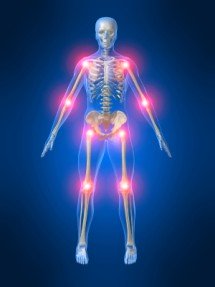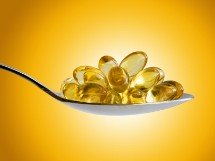Inflammatory Markers and Antiaging
Inflammatory markers are used to gauge the level of inflammation in your body. Since inflammatory cytokines are such a big factor in chronic disease, we need to combat them using anti inflammatory foods with the addition of anti inflammatory supplements when needed!
Inflammation and Chronic Disease
Inflammation is a normal part of your body's defense mechanisms and has a positive role in protecting you from injury and infection. However when your natural inflammatory response becomes chronic, inflammatory cytokines damage tissue and undermine your long term health.
This is an example of too much of a good thing and we need to take steps to keep chronic inflammation from becoming a problem. We detect chronic inflammation using what we call inflammatory markers.

Your doctor can test for these markers and when they show elevated levels of the inflammatory cytokines, you need to take steps to bring the levels down and get the inflammation back under control.
Using anti inflammatory foods, anti inflammatory supplements, and stress reduction techniques you can reign in chronic inflammation and enhance your long term health.
Inflammatory Markers
The major marker of inflammation used in diagnostic testing is C-reacive protein. This marker indicates the total amount of tissue undergoing inflammation. It has become an important predictor of heart disease risk as inflammation in the coronary arteries can cause damage on lead to heart attacks and strokes.
There are several markers consisting of proteins called inflammatory cytokines. These are signaling molecules that modulate the response of your immune system to infection or physical injury.
By monitoring these levels we can tell how much inflammation your body is undergoing and when we get the levels of these markers down, we know that inflammation has been reduced.
Here are some reference ranges for these inflammatory markers:
- C-reactive protein is elevated in response to injury and/or infections
- 10-40mg/L – mild inflammation
- 40-200mg/L – acute inflammation/bacterial infection
- 300mg/L or above – usually seen in burns or serious infections
- PLAC® Test (Lp-PLA2)(Lipoprotein-associated Phospholipase A2) measures inflammation in the arteries
- reference range: 81–259 ng/mL – below 200 is consistent with reduced risk of heart attack or stoke
- Interleukin-6: is secreted by T-cells and macrophages in infection or injury to stimulate a response by your immune system
- normal reference range is: 0–14 pg/mL
Unfortunately conventional medical science tends to look at these factors in isolation, as separate risk factors to be controlled by medication. The treatment model which is pervasive in medicine is aligned with the profit model of the pharmaceutical industry.
Thus we get many drugs to treat individual risk factors. The functional medical model seeks to treat problems at their root once they have been identified. Thus nutrition is the first line of defense against the ravages of inflammation from inflammatory cytokines.
Exercise to Combat Inflammation
The primary benefit that proper exercise confers on reducing inflammation is helping to control blood sugar. The best form of exercise for reducing inflammation is interval training. This is because it does not general free radicals the way long duration cardio exercise does.
Maintaining muscle mass with strength training, and interval training will benefit your hormonal system and stabilize your blood sugar. The nervous system also benefits, and because the nervous system regulated the action of inflammatory cytokines, the right kind of exercise will reduce chronic inflammation and protect your body from stress.
Anti Inflammatory Foods and Supplements
Your best defense against inflammation is a diet that conforms to your blood type, avoids foods known to aggravate inflammation, and contains anti inflammatory foods that naturally fight chronic inflammation.

Lipid chemistry is complex, but the short answer to the problem is to consume stable fats which have undergone a minimum processing. These are the saturated and mono-unsaturated fats like coconut oil and olive oil. Saturated and monounsaturated fats are chemically stable due to their molecular structure, thus to not promote oxidative stress.
Polyunsaturated fats due to their chemical nature and processing are highly reactive and have the potential to exacerbate inflammatory conditions in the body. Steer clear of trans fats, hydrogenated oils, canola oil, corn oil, ect.
Anti Inflammatory Supplements
Nutritional supplements that have anti inflammatory properties and can reduce inflammatory markers are many. Fish oil heads the list. In fact the Omega 3 Index can predict heart disease risk with over 90% accuracy. Omega 3 fatty acid status is the single biggest predictor of cardiovascular disease risk.

The list of medical condition in which there is a demonstrative benefit to consuming fish oils is as long as my arm. That said, get your fish oil every day. It's potent anti-inflammatory effects will protect both your heart and brain as well.
Other anti inflammatory supplements worth noting are curcumin, boswella, nettle, serrapeptase, bromelain, resveratrol, alpha lipoic acid, pycnogenol, and grape seed extract.
One of the keys to controlling inflammation is to control free radical activity and oxidative stress. You can do this with grounding, drinking alkaline water, and/or using a water additive like Willard's water to help keep inflammatory markers low.
Remember that any substance that “donates” free electrons can act as an antioxidant. Detoxifying the body and getting rid of heavy metals is also an effective strategy, as the heavy metals can through their promotion of free radicals increase inflammation.
An antiaging doctor can check your inflammatory markers and then create a plan for you to reduce chronic inflammation, using anti inflammatory foods, anti inflammatory supplements, and exercise.
The result will be a longer, much healthier life, without the limitations of chronic disease and pain!
Return from Inflammatory Markers to Antiaging Program
Return from Inflammatory Markers to Longevity and Antiaging Secrets
New! Comments
Care to comment? Feel free to leave your comments below!